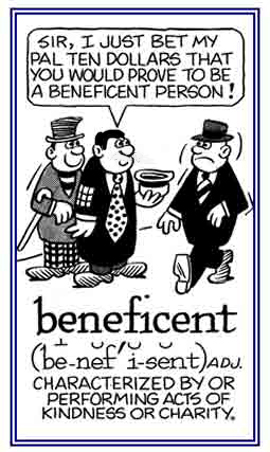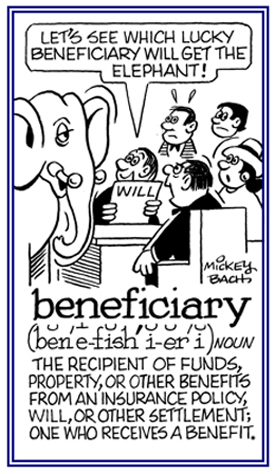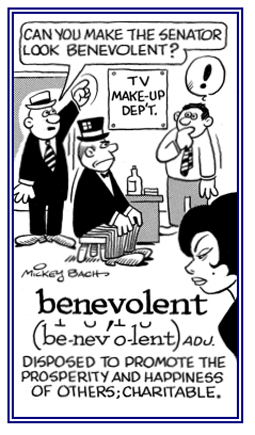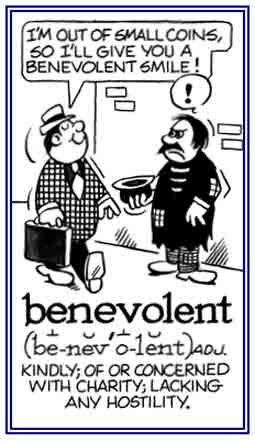bene-, ben-, beni-
(Latin: good, well)
An ecclesiastical term referring to the paid position for a member of the clergy attached to a church, typically by way of an endowment to the church: Fredrick studied hard at the theological institute hoping to receive a benefice at the church where he grew up.
An act or gesture of goodness or kindness towards an individual or groups of people: The priest assured the generous donator, Mrs. Johnson, that her beneficence for the local church would be justly rewarded in heaven.
beneficent (adjective), more beneficent, most beneficent
Descriptive of an act or activity that is kind, generous, intended to help others, etc.: The organization for the homeless received a significant and very liberal, but anonymous donation, the most beneficent gift which they have received this year.

© ALL rights are reserved.

© ALL rights are reserved.
Go to this Word A Day Revisited Index


Go to this Word A Day Revisited Index
so you can see more of Mickey Bach's cartoons.
beneficently (adverb), more beneficently, most beneficently
Relating to that which is compassionate, kindhearted, helpful, and generous: Hudson's beneficently grand gesture when making the donation to the theater belied the fact that he was really a financially struggling actor.
Some insects are harmful for people; however, there are some that are beneficently contributing to the welfare of humans.
beneficial (adjective), more beneficial, most beneficial
Descriptive of that which brings about a positive result, is favorable, and good: Drinking lots of fresh water is a beneficial action which supports good health.
beneficially (adverb), more beneficially, most beneficially
Relating to something that is done in a helpful, useful manner, and is designed to promote a positive outcome: Regular jogging, or going for walks, will beneficially act in helping to improve Susan's strength and breathing.
That which is useful, done for one's good, or is helpful to an individual or a group: Dr. Simmons always recommended the beneficialness of fresh air, physical activity, lots of rest, and a proper diet as a procedure for the good health of his patients.
The recipient of gifts or gestures of kindness and generosity: The high school was the beneficiary of a large donation of sports equipment from the local hockey organization.

© ALL rights are reserved.
Go to this Word A Day Revisited Index

Go to this Word A Day Revisited Index
so you can see more of Mickey Bach's cartoons.
1. An event that is organized typically to raise money or contributions for an undertaking: Catherine's Aunt Ruth is the chairperson for the annual benefit to raise funds to support the local community orchestra.
2.A payment or service given or which is made available to an individual to support his or her health, physical activities, etc.: The insurance company paid a benefit to James who had been injured while working on a construction project.
2.A payment or service given or which is made available to an individual to support his or her health, physical activities, etc.: The insurance company paid a benefit to James who had been injured while working on a construction project.
benefit (verb), benefits; benefited, benefitted; benefiting, benefitting
To profit, to cash in on, or to help others: Jan has really benefitted by going to the fitness studio three or four times a week.
1. The act of preventing the artificial prolongation of life with medication: Benemortasia allows a hopelessly sick or injured patient to die by not administering extraordinary medical measures to extend his or her condition.
2. Etymology: from Latin, bene mori, "to die well" or "a good death".
2. Etymology: from Latin, bene mori, "to die well" or "a good death".
Coined in the early 1970’s by A.J. Dyck, of Harvard University, and it essentially refers to "passive euthanasia" as opposed to the generally accepted "active" implications of euthanasia.
1. Disposition to do good, a desire to promote the happiness of others; kindness, generosity, charitable feeling as a general disposition towards mankind at large: The benevolence of the musicians' union was seen in the generous number of free musical instruments the members gave to the community's music school.
2. An expression of goodwill, an act of kindness; a gift or grant of money; a contribution for the support of the poor: The widow gave a generous benevolence to the community library in memory of her late husband who had been an author and had also donated many books to that library.
2. An expression of goodwill, an act of kindness; a gift or grant of money; a contribution for the support of the poor: The widow gave a generous benevolence to the community library in memory of her late husband who had been an author and had also donated many books to that library.
benevolent (adjective), more benevolent, most benevolent
1. A reference to a desire to do good things for other people, of a kindly disposition, charitable, generous: An anonymous and benevolent donor provided funds to help the homeless people in Hugo's community.
2. Pertaining to an organized effort to do good things for people: Rene's sister volunteered to work with a benevolent organization that helps elderly people get the help that they need so they can stay in their homes if that is their desire.

© ALL rights are reserved.

© ALL rights are reserved.

© ALL rights are reserved.
Go to this Word A Day Revisited Index
2. Pertaining to an organized effort to do good things for people: Rene's sister volunteered to work with a benevolent organization that helps elderly people get the help that they need so they can stay in their homes if that is their desire.



Go to this Word A Day Revisited Index
so you can see more of Mickey Bach's cartoons.
benevolently (adjective), more benevolently, most benevolently
1. An inclination to perform kind, charitable acts: Sarah was benevolently inspired when she decided to volunteer at local children's medical clinic.
2. Characterized by a kindly act; such as, a gift given out of generosity: Henry's mother acted benevolently when she gave a large music scholarship to the local university.
2. Characterized by a kindly act; such as, a gift given out of generosity: Henry's mother acted benevolently when she gave a large music scholarship to the local university.
benevolentness (noun) (no plural)
An act that is philanthropic, human, kind, and generous by nature: The advertising campaign of the symphony orchestra foundation appealed to the benevolentness of the patrons who support the arts and culture of the city.


